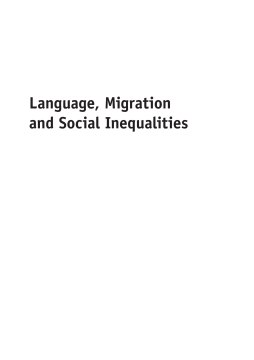
BOOK
Language, Migration and Social Inequalities
Alexandre Duchêne | Melissa Moyer | Dr. Celia Roberts
(2013)
Additional Information
Book Details
Abstract
Migration and the mobility of citizens around the globe pose important challenges to the linguistic and cultural homogeneity that nation-states rely on for defining their physical boundaries and identity, as well as the rights and obligations of their citizens. A new social order resulting from neoliberal economic practices, globalisation and outsourcing also challenges traditional ways the nation-state has organized its control over the people who have typically travelled to a new country looking for work or better life chances. This collection provides an account of the ways language addresses core questions concerning power and the place of migrants in various institutional and workplace settings. It brings together contributions from a range of geographical settings to understand better how linguistic inequality is (re)produced in this new economic order.
This stimulating volume brings together classic strands of critical sociolinguistic work on how immigrants are disadvantaged in social gatekeeping institutions and the contemporary sociolinguistics of globalization. Taking a broad view of 'migrants' as sociolinguistically mobile citizens, the authors mobilize an impressive array of ideological, political and economic frameworks to explore the continuing power of institutions to confer and withhold status and opportunity as well as forms of resistance to these processes.
Alexandra Jaffe, California State University, Long Beach, USA
This book contains a wealth of good scholarship and revealing critical analyses of the local ways in which social inequality is produced or contested. Each of the contributions has been very well written and the authors show a sincere commitment to learning how language issues affect people’s life chances.
Joan Pujolar, Universitat Oberta de Catalunya, Spain
Language, Migration and Social Inequalities is a welcome addition to the growing literature on language and globalization. This volume can be easily incorporated in an upper-level undergraduate or graduate course in sociolinguistics and linguistic anthropology. Chapters can be regrouped to reveal different issues...All in all, this volume offers a productive way into examining the intersections of language, migration, and social inequality especially in late-capitalist social democratic states.
Jennifer F. Reynolds, University of South Carolina, USA
This major sociolinguistic contribution, with its wide-ranging and detailed ethnographic attention to the structures shaping migrant experiences of language, sheds innovative analytic light on the neoliberal regimentation of language at work, in school, and in bureaucratic processes, the commodification of language skills, and the contradictions of contemporary capitalism that shape linguistic practices and ideologies.
Bonnie Urciuoli, Hamilton College, USA
This book does a wonderful job of focusing critically on the sociolinguistics of migrant workers - the protagonists of the book - in various institutions and workplaces (or their exclusion from them). From the informal locutorios of Barcelona and Congolese la débrouille in Cape Town, to the decapitalisation of migrant students in Madrid schools and the mismatched aspirations and actual work of Japanese flight attendants, these studies focus both on local migrant sociolinguistics as well as wider social and economic orders. Making questions of the (re)production of linguistic, social and economic disparities central, this book thus provides vital insights into language, mobility and inequality.
Alastair Pennycook, University of Technology, Sydney, Australia
Alexandre Duchêne is Professor of Sociolinguistics at the University of Fribourg and Director of the Institute of Multilingualism of the University and HEP Fribourg (Switzerland). Recent publications include Ideologies across Nations (2008), Discourses of Endangerment (with Monica Heller, 2007) and Language in Late Capitalism: Pride and Profit (with Monica Heller, 2011).
Melissa Moyer is Professor of English Linguistics at the Universitat Autònoma de Barcelona, Spain, where she leads the C.I.E.N. Research Team. Her current research is concerned with multilingualism and mobility in connection to linguistic practices and the construction of identity. She was editor of The Blackwell Guide to Research Methods in Bilingualism and Multilingualism (2008, with Li Wei).
Celia Roberts is Professor of Applied Linguistics at King's College London, UK in the Centre for Language, Discourse and Communication. Her publications include Talk, Work and Institutional Order (1999, with Srikant Sarangi). Her main interest is in the practical relevance and application of sociolinguistics to real world problems.
Table of Contents
| Section Title | Page | Action | Price |
|---|---|---|---|
| Contents | v | ||
| Contributors | vii | ||
| 1 Introduction: Recasting Institutions and Work in Multilingual and Transnational Spaces | 1 | ||
| Part 1 Sites of Control | 23 | ||
| 2 Trade Unions and NGOs Under Neoliberalism: Between Regimenting Migrants and Subverting the State | 24 | ||
| 3 Skilling the Self: The Communicability of Immigrants as Flexible Labour | 55 | ||
| Part 2 Sites of Selection | 82 | ||
| 4 The Gatekeeping of Babel: Job Interviews and the Linguistic Penalty | 83 | ||
| 5 Language Work Aboard the Low-cost Airline | 97 | ||
| 6 (De)capitalising Students Through Linguistic Practices. A Comparative Analysis of New Educational Programmes in a Global Era | 120 | ||
| 7 From kebapçı to Professional: The Commodification of Language and Social Mobility in Turkish Complementary Schools in the UK | 149 | ||
| Part 3 Sites of Resistance | 170 | ||
| 8 ‘Integration hatten wirletztes Jahr’. Official Discourses of Integration and Their Uptake by Migrantsin Germany | 171 | ||
| 9 Language as a Resource. Migrant Agency, Positioning and Resistance in a Health Care Clinic | 196 | ||
| 10 Informal Economy and Language Practice in the Context of Migrations | 225 | ||
| 11 Fighting Exclusion from the Margins: Locutorios as Sites of Social Agency and Resistance for Migrants | 248 | ||
| Postscript | 272 | ||
| Index | 277 |
